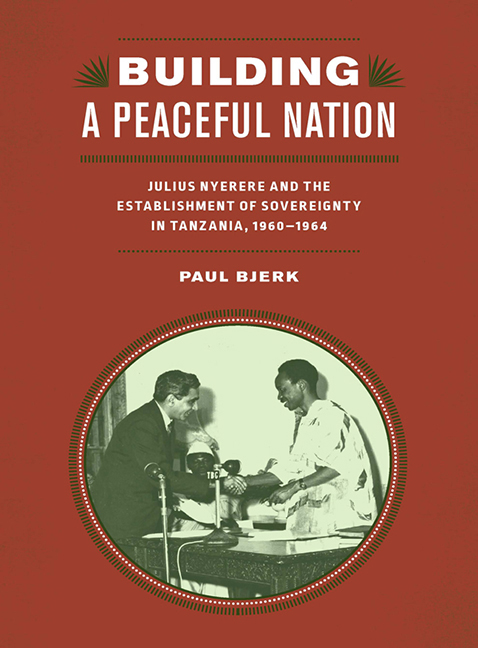 Building a Peaceful Nation
Building a Peaceful Nation 10 - Contending with International Intrigue
Published online by Cambridge University Press: 08 May 2021
Summary
The second half of 1964 brought continual contention with signs of intervention, spycraft, and planted rumors. Cold War powers enhanced their own freedom of action by sowing confusion that constrained the ability of other countries to ascertain the necessary intelligence to react. Eastern and Western powers used secrecy and misdirection to distract their rivals for both defensive protection and offensive tactics. Such deliberate distraction served to make the “Third World” countries they fought over look naive and irresponsible. For countries like Tanzania, this meant operating amid uncertainty, compelled to act even when confronted with evidence that beggared belief.
A key insight of discursive analysis is the idea that communication is a two-way street, where the speaker never quite knows how the hearer will interpret the message. In diplomacy and spycraft, this ambiguity is an asset deliberately deployed. Lies and secrets are not only a way of hiding information but also, as Luise White proposed, ways “to make certain information so charged that its value and importance is unlike that of other information.” In such a kaleidoscopic crucible, Tanzanian leaders struggled constantly throughout 1964 to divine superpower intentions and preempt foreign intervention, which from their perspective seemed imminent. In the Union Treaty, the Tanzanian leadership showed that they could respond to Cold War intrigue in kind. But the Union radicalized Tanzanian foreign policy, and brought with it a new awareness of the risks its ideology entailed. Tanzania successfully defended its autonomy during a year in which its newly constituted United Republic faced numerous inscrutable challenges to its sovereignty.
During this period, Tanzania's internal search for competent leadership could easily have been derailed by external actors, as had happened in the Congo. Abdulrahman Babu's intelligence, idealism, and organizing ability impressed Nyerere and many others, but as elsewhere in the Cold War world, these very abilities became a hindrance to his advancement. Frank Carlucci reported, with typical theatricality, “Babu most dangerous of group because … he most able man in government.” Karume, whom American diplomats underestimated as “ignorant and inept,” was a safer and preferable choice. The promotion of mediocre leadership by Cold War powers provided an attractive means to restrain postcolonial autonomy and tended to produce dictators of limited political creativity.
- Type
- Chapter
- Information
- Building a Peaceful NationJulius Nyerere and the Establishment of Sovereignty in Tanzania, 1960–1964, pp. 228 - 254Publisher: Boydell & BrewerPrint publication year: 2015


